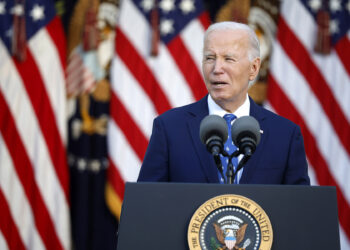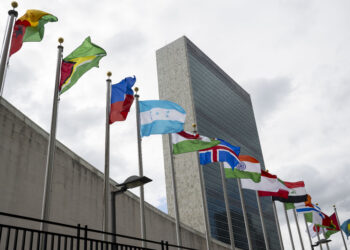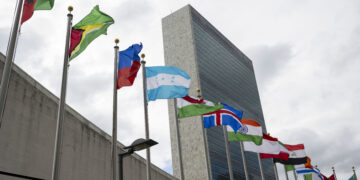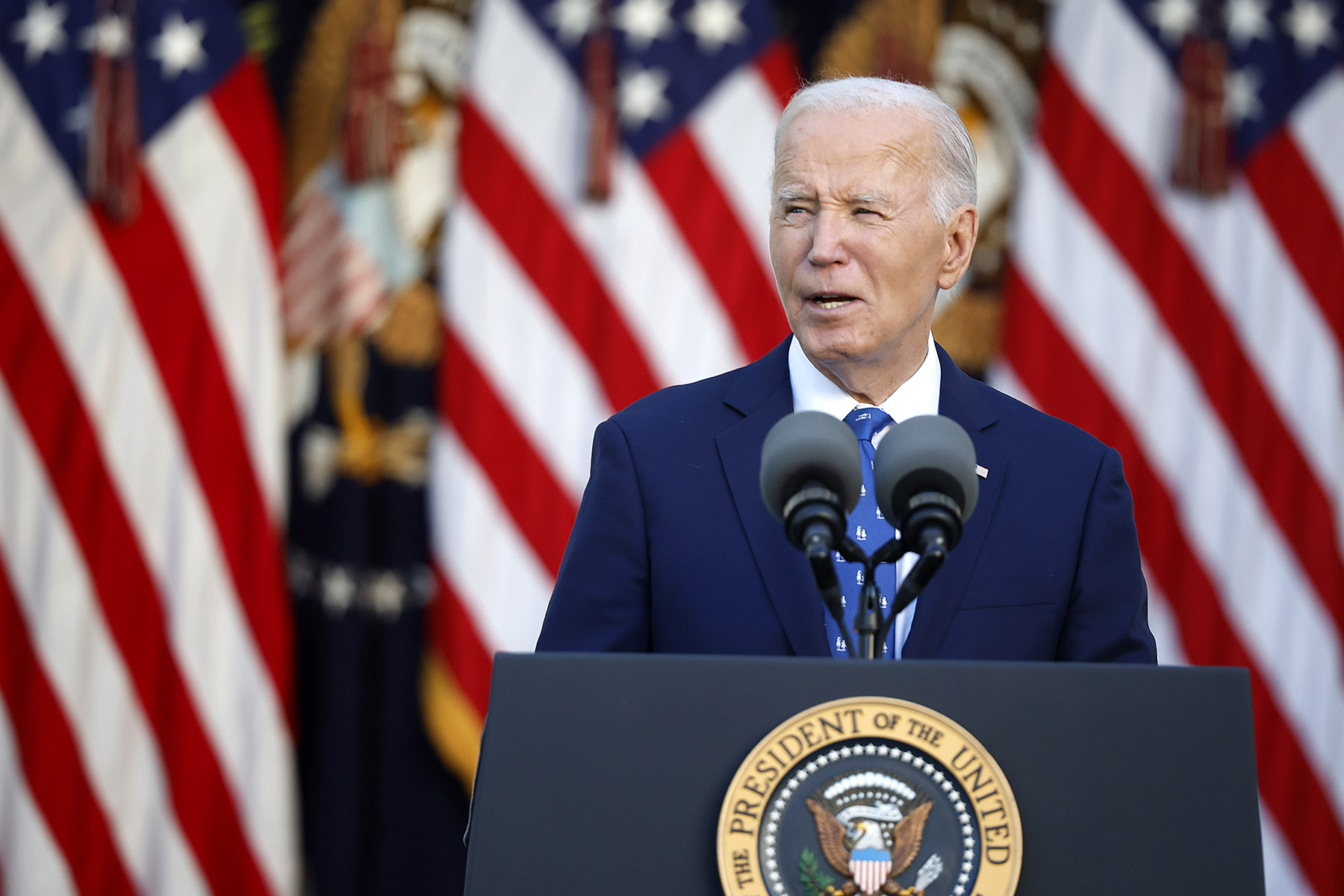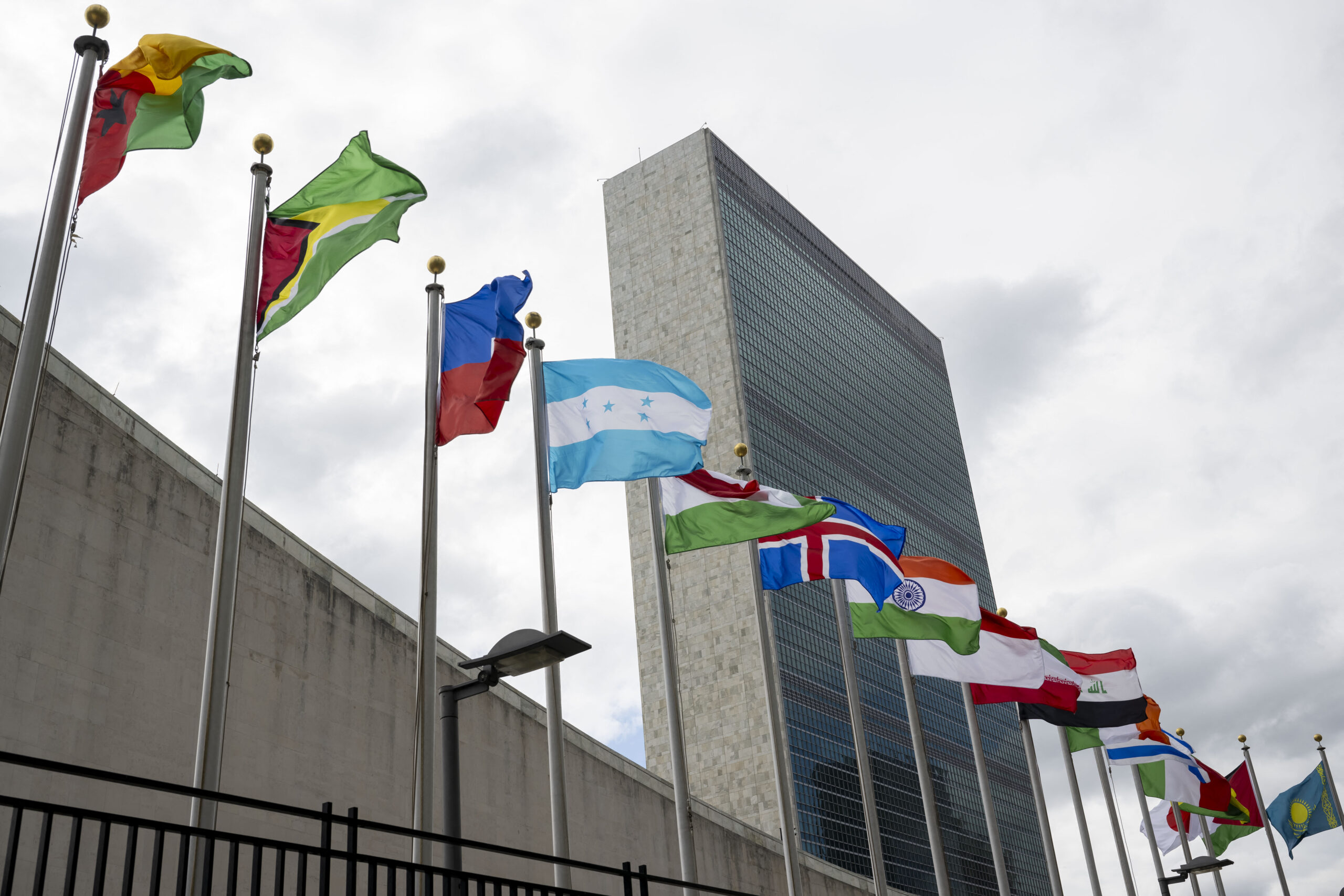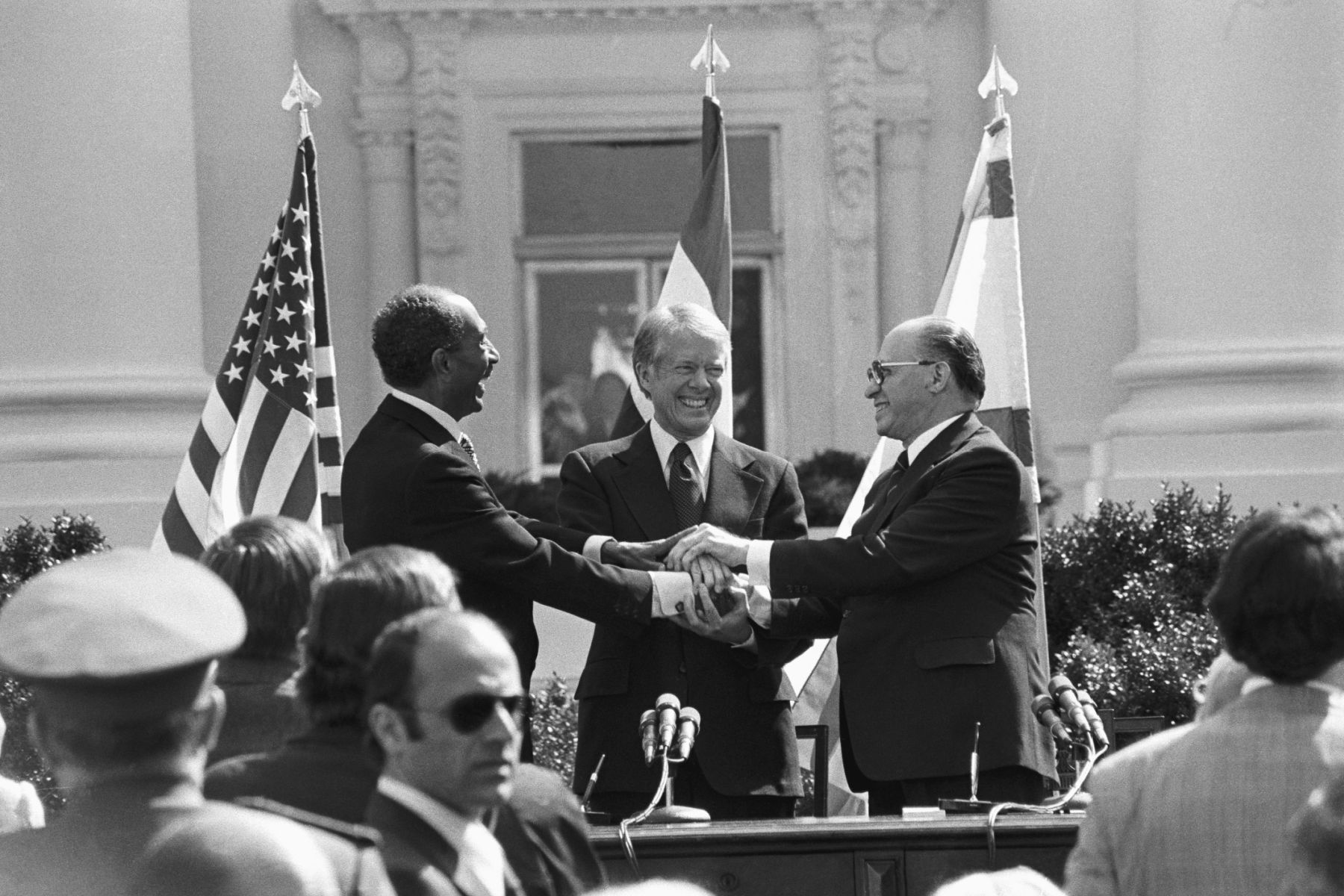Ambassador Frederic C. Hof is a senior fellow at Bard College’s Center for Civic Engagement. He is the author of Reaching for the Heights: The Inside Story of a Secret Attempt to Reach a Syrian-Israeli Peace.
Dissent is growing within the Biden administration over Israel's war in Gaza, with more officials across the government, from the Pentagon to the U.S. Agency for International Development, calling for a cease-fire. "At the State Department," according to recent reporting by The Washington Post, "there have been multiple dissent cables from diplomats urging the administration to use more leverage to stop the violence." Having served in the State Department as a mediator seeking peace between Israel and Syria and later as a special adviser on Syria's political transition, I know something of the dissent options available to American diplomats. Their internal criticisms of President Joe Biden's Gaza policy may indeed help make a profound difference for the better.
American diplomats, like their counterparts everywhere, are expected to represent and faithfully implement the policies and instructions of their superiors. When obliged to support policies they find repugnant, American diplomats are legally entitled to dissent openly. They may do so through their normal reporting channels or, more formally, to the Secretary of State's Policy Planning Staff via a "dissent channel" cable or memorandum—a system set up during the Vietnam War to air internal disagreements over U.S. foreign policy. In either case, those who register their dissent are protected, both legally and administratively, by the provisions of the Foreign Affairs Manual, which governs the operations of the Department of State. Although those who dissent are by no means excused from their representational and implementation duties as diplomats, a well-led State Department will do more than protect dissenters: It will listen to them and make policy adjustments consistent with the desires of the president.
It is not at all surprising that Biden's Gaza policy has led to dissent within the State Department and elsewhere in government. Biden's unconditional public support for Israel in the immediate wake of Hamas's atrocities on Oct. 7 seemed to have provoked little or no official dissent. But the manner of Israel's military response in Gaza has, falling as it does mainly on defenseless Palestinian civilians, with some 15,000 Palestinians—mostly women and children—killed in a matter of weeks.
In August 2012, I acted on my dissent from President Barack Obama's Syria policy by resigning my State Department position as an adviser on Syria to the Secretary of State. Although my superiors were aware of my dissatisfaction with a U.S. policy that combined rhetorical outrage over President Bashar al-Assad's mass killing of Syrian civilians with an operational refusal to defend Syrian civilians from that regime, it never occurred to me to use the dissent channel. Even in retrospect, I think it would have been useless in the context of Syria.
Dissent within the State Department over President Joe Biden's Gaza policy may indeed help make a profound difference for the better.
- Frederic C. Hof
Indeed, four years after I resigned, 51 diplomats at the State Department used the dissent channel to formally protest the Obama administration's Syria policy, including the failure to protect Syrian civilians—the same issue that had caused me to leave government. The dissenters called for U.S. airstrikes on the Assad regime to ground its warplanes and stop its bombing of civilian areas, which they argued would pressure Assad into abiding by a cease-fire and actually engaging in negotiations to end the war. They received a polite and professional hearing from Secretary of State John Kerry. But Obama had long since made up his mind. Beyond generous U.S. support for refugee relief, he would leave office the next year having protected not a single Syrian civilian from Assad's brutality. For Obama, the deaths of hundreds of thousands of Syrians were regrettable, but they were of insufficient policy importance to dictate action.
Many professionals in the U.S. government and observers outside of it knew differently. They knew the failure to protect Syrian civilians reflected moral bankruptcy. They knew that Russia's Vladimir Putin was drawing dangerous conclusions about the contrast between American cries of outrage in the United Nations and inaction on the ground in Syria. They knew—and especially the dissenting State Department diplomats knew—that nothing approaching an invasion and occupation of Syria by U.S. forces (Obama's excuses for inaction) would be needed to erase the Assad regime's air force or silence its artillery, thereby saving tens of thousands of lives.
It should come as no surprise, therefore, that there are now professionals in the State Department and elsewhere who believe their superiors, beginning with President Biden at the top, should be doing more to protect Palestinian civilians in Gaza. Yet unlike their predecessors who protested seven years ago to a commander-in-chief who folded his arms and turned his back, the current crop of dissenters may succeed.
What Syria and Gaza have in common is armed conflict where the devastation has fallen disproportionately on civilians. It is this commonality that is driving the latest wave of State Department dissent. In some key respects, however, Syria and Gaza are different.
In 2022, the U.N. Human Rights Office estimated that over 300,000 Syrian civilians had been killed during 11 years of conflict. Although Assad to this day falsely claims his regime neither used barrel bombs nor possessed chemical weapons, his forces spent over a decade deliberately targeting civilians. It was a policy of state terror that, many warned for years, amounted to war crimes and crimes against humanity. Earlier this month, a court in France issued international arrest warrants for Assad, his brother Maher (the commander of the Syrian army's 4th Armored Division) and two generals, accusing them of complicity in war crimes and crimes against humanity.

One issue the 2016 dissent channel on Syria did not have to address was the use of U.S. weaponry in the context of massive civilian casualties, given the billions in annual U.S. military assistance to Israel. If there had been provisions in Russian law for the protection of diplomatic dissent, perhaps some of Moscow's diplomats would have objected to Assad's indiscriminate use of Russian weaponry to commit mass murder and to the enthusiastic participation of the Russian Air Force in the slaughter. Although no one in today's State Department would equate Israel in Gaza with Assad (and Russia) in Syria, the use of American weaponry by Israel in Gaza City and elsewhere raises acute concerns throughout the U.S. government—and not just in the minds of those officially dissenting.
The State Department oversees arms transfers and military assistance, and several U.S. laws and policies restrict military support to countries that would use them to violate the laws of war. Josh Paul, an official in the State Department's Bureau of Political-Military Affairs, resigned in October over the Biden administration's continued military assistance to Israel. "The idea that U.S. arms should not be used to kill civilians has never been a controversial one in any of the four administrations I have served," he wrote in a Washington Post op-ed explaining his resignation. Even if Palestinian civilians in Gaza are not (as Israel insists) the targets, American officials are nevertheless profoundly affected by the war's carnage and the humanitarian catastrophe they see in Gaza and deeply alarmed by the potential negative implications for U.S. foreign policy in the region and around the world.
In Gaza, where the pace of civilian deaths has been staggering in just a few weeks, Israel insists it distinguishes between military targets and civilians and seeks to minimize civilian casualties—even as it drops 1,000- and 2,000-pound bombs onto densely populated areas. Israel maintains it is applying the principle of "proportionality" under international law, which dictates that the nature and value of a military target be evaluated with a view toward limiting civilian casualties, which should be "proportional" to the value of the target engaged. But in the dense urban battlefield of Gaza, Israel's eagerness to neutralize those responsible for the outrages of Oct. 7 have produced outrages of its own.
Yes, Israel claims it is adhering to proportionality in its bombing of Gaza, but international law does not offer mathematical guidance on what is proportional. Imagine, for example, if Hamas had somehow seized Tel Aviv. Would the Israel Defense Forces be using one-ton bombs to kill a group of Hamas fighters in an apartment block packed with Israeli civilians? How would proportionality be calculated by the IDF and its lawyers if the liberation of Tel Aviv were the military objective, not the destruction of Hamas's armed wing in Gaza City?
What Syria and Gaza have in common is armed conflict where the devastation has fallen disproportionately on civilians.
- Frederic C. Hof
One is not downplaying the heinous acts of Hamas on Oct. 7 by saying that the civilian toll in Gaza from Israel's military response is too high. The people of Gaza are not responsible for Oct. 7; Hamas is. Combat operations should cease, hostages should be released, and the IDF should withdraw. That appears to be the message of dissent within the State Department, and Biden should want the civilian slaughter to stop too, for humanitarian reasons as well as political ones, both domestically and abroad. What Biden is seeing—just as what President Ronald Reagan saw as Beirut was being besieged by the IDF in 1982—should tell him that enough is enough. Yes, he will pay a political price if Hamas gets a second life. Republicans calling for Israel to flatten Gaza will denounce him, of course, while some progressive Democrats will not likely forgive him for having supported Israel's war in the first place.
Those officials at the State Department who are dissenting are not political naïfs. They know there are no silver bullets when it comes to pressuring Israeli Prime Minister Benjamin Netanyahu to accept, in essence, the return of all hostages as the culmination of a military campaign Israel promised would "eradicate" Hamas. Perhaps the most Biden can do is tell Netanyahu that there is no support anywhere for renewed fighting in Gaza—and that Biden himself might even have to address Israelis publicly to call for an end to the war. Threats to cut off future supplies of U.S. military aid would, given Israel's existing inventory, have no effect on current military operations and might negate Biden's popularity among Israelis and his ability to persuade them. It is not inconceivable that Biden's warm embrace of Israelis post-Oct. 7 may yet pay dividends.
If Israel's political objective is a Gaza Strip no longer providing a haven for security threats, surely an effort must be made to secure the cooperation of Palestinians, not only in Gaza but in East Jerusalem and the West Bank. It may be futile given the way Israel has waged its war. But if accompanied by an Israeli political commitment to a two-state solution, thanks to American pressure facilitated by State Department dissent, Hamas might yet be killed politically. That is why the dissenters should consider urging the Biden administration to confirm its stated commitment to an independent Palestinian state by drafting American text for an Israeli-Palestinian peace agreement. U.S. mediation for peace between Israelis and Palestinians that begins with nothing in writing will end with nothing in writing, a hard lesson learned by mediators from Bill Clinton to George Mitchell to John Kerry.
Despite what some may think, Washington doesn't control everything. American diplomats, like others in the U.S. government, know how uncontrollable things really are. When dissent within the ranks of the State Department is protected and even encouraged, it enhances U.S. national security. Secretary of State Antony Blinken is getting from State Department dissenters what he does not often get from op-ed writers and other pundits: practical, implementable policy alternatives that may save thousands of innocent lives and salvage the reputation of the United States. Biden should not only listen to the dissent channel; he should act.













